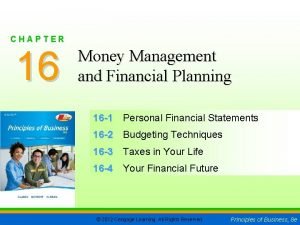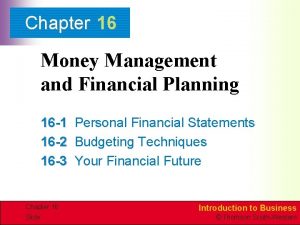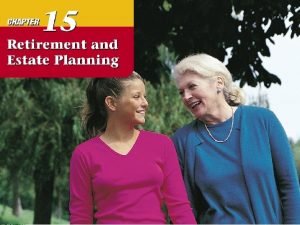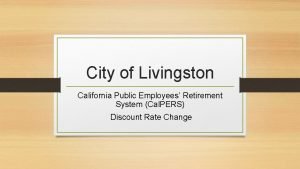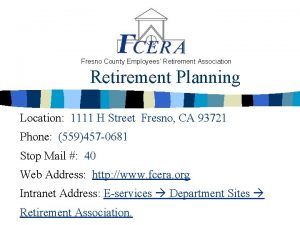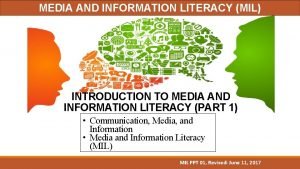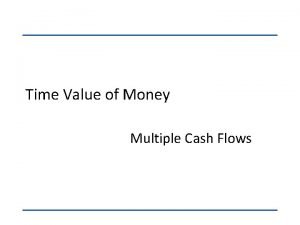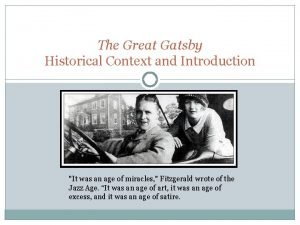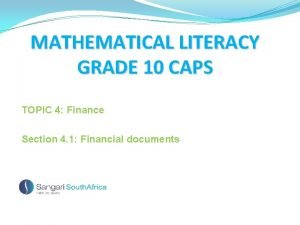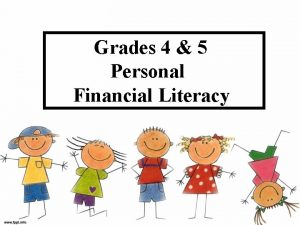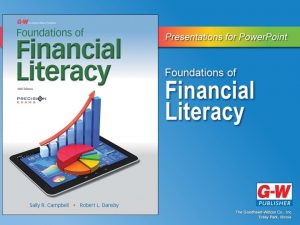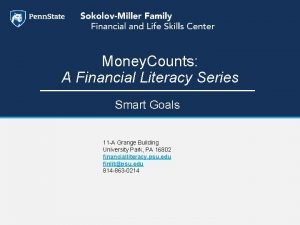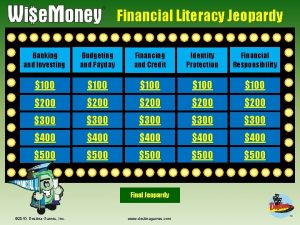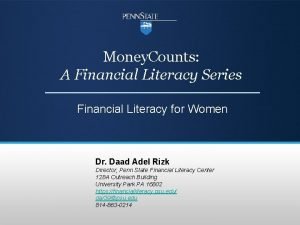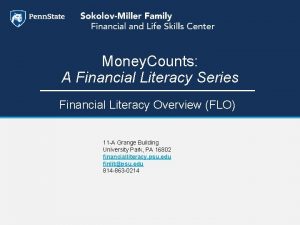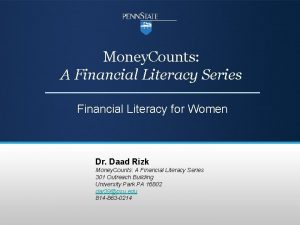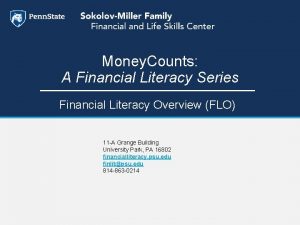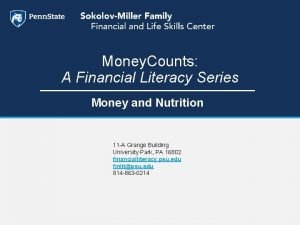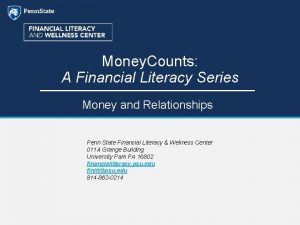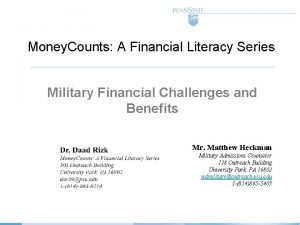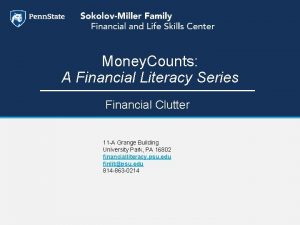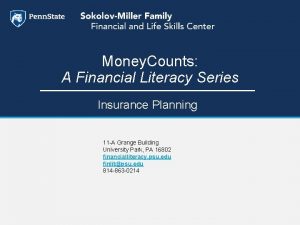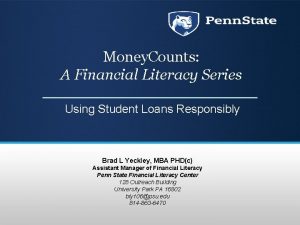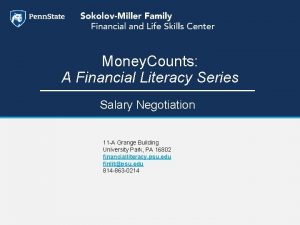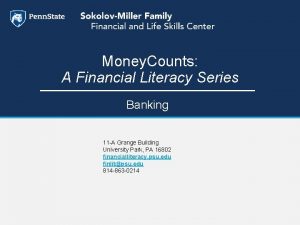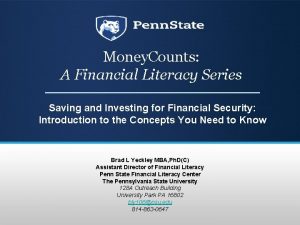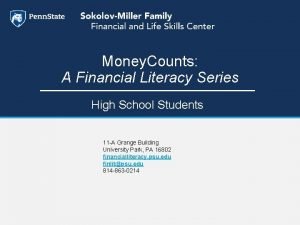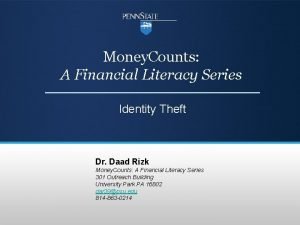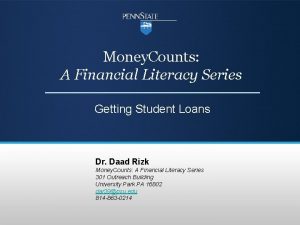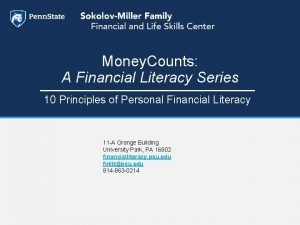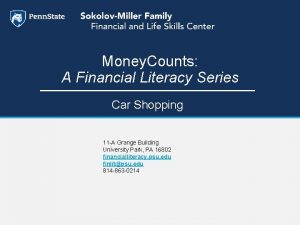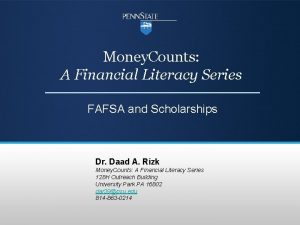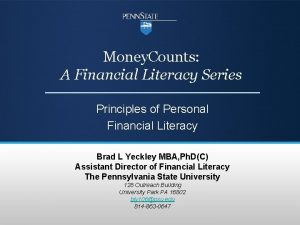Money Counts A Financial Literacy Series Retirement Planning


























- Slides: 26

Money. Counts: A Financial Literacy Series Retirement Planning 11 -A Grange Building University Park, PA 16802 financialliteracy. psu. edu finlit@psu. edu 814 -863 -0214

Description • Young people are busy starting careers, families, or settling in new locations, so it is extremely challenging to think about retirement planning. • However, life goes by so fast. Every year that you waste postponing retirement planning means adding a year of depriving yourself of retiring early and enjoying the golden years.

Learning Outcomes • Discuss most common retirement plans available • Understand the similarities and differences of various plans • Understand how to create your own retirement plan • Discuss how to avoid common mistakes • Understand how to forecast a retirement budget

Retirement!

• Accumulation of assets • Saving and Investing • Time Value of Money! Stages of Retirement Planning • Protection of assets • Diversification • Risk management • Distribution of assets • Longevity – Making money last & ends meet • Tax impact/bracket

Interest Risk Income Investment Length Retirement Planning Tax

Retirement plans Individual Plans Traditional IRAs Self-employed & Small Business Owners Plans Employer. Sponsored Plans Roth IRAs SIMPLE Benefit Plans Contribution Plans Thrift Savings SEP

IRAs Plans comparison Age to contribute Tax Traditional IRAs Roth IRAs Anyone younger 70½ No age restriction Contribution: Taxdeductible Contribution: Taxed Withdrawal: Tax-deductible No Penalty after age 59½ Withdrawal Required at age 70½ No age requirement

It is all about YOU! Retirement Planning le Lifesty Budget bts e D Health & medic al issues Family Income Leg sta al tus Assets

Your lifestyle Do you know what you want to do after retirement? Will you be starting a new career? Will you volunteer or work from home? Will you be traveling or keeping the status quo? You may even postpone retirement for as long as you can. Think about which lifestyle you would like to pursue.

Budget Did you forecast a budget for your golden years? Is it based on your current standard? Will you downsize your house and trim expenses? Can you estimate your future fixed and variable expenses? What is the minimum you will need to sustain to be comfortable in your golden years?

Health & medical issues Do you enjoy good health? Do you expect chronic medical problems as you get older? Do you have a contingency plan if you need to retire early? Will you have or be able to get medical insurance?

Income What will be the primary source of your income? Do you have a pension? Do you have an employer-sponsored retirement plan, if yes, when will you reach eligibility? Will you qualify for social security benefits? Do you have personal saving, investments, or emergency funds you can liquidate?

Assets Do you have an inventory listing of all of your assets over the years? Did you have financial relationships with prior employers? Can you account for your investments? If not, you will need to create a life-long dossier of your financial wealth.

Debts Will you be free of all consumer debts? What about your mortgage or student loans?

Legal Do you have your legal status in check? How do you ensure your wishes will be respected if anything happens to you? If not, you will need to create a life-long dossier of your legal documents, such as a will, trust, power of attorney, living will, medical directive, general or specific power of attorney, estate executor, or guardian (as needed).

Family matters Do you have your beneficiaries updated on all your documents? Do you plan to provide for family members after you are gone? Do you need to invest in life insurance?

When planning retirement plan

Forecasting a Budget! State & Divide Examine & Adjust Allocate Delete Adjust Add “wants” Add “needs”

Where to start? State & Divide • State all your current expenses • Divide them into fixed, mixed, and variable ones Examine & Adjust • Examine each category and note adjustments • For example, if you plan to stay in your current home, you can easily determine if you will be mortgage free at retirement or not. • You know approximately the cost of keeping your house and all related expenses such as real estate tax, repair, maintenance, etc.

Allocate up or down! Allocate • Allocate a dollar amount to each adjustment, up or down • For example, you allocate zero amount for a mortgage on your house, but you state an amount of real estate tax, insurance, repair, and maintenance.

Delete what you don’t need! Delete • Delete items from your budget that you will no longer need after retirement • For example, professional clothes or work transportation may not be necessary after you retire.

Add what you will need! Add “needs” • Add items to your budget that will be deemed necessary after your retirement • For example, you may need more budget for medical expenses or a special diet after you retire. Add “wants” • Add items to your budget that you will want to do after retirement • For example, if you want to travel or play golf more often after retirement, such things should be included in your list.

Make adjustments as needed! Adjust • Make all other adjustments until you reach a minimum dollar amount you must have at retirement • Be honest with your calculations and careful not to over or undershoot • This amount will help you and your financial adviser formulate a plan to determine the present value of your investment so your future will be protected accordingly

Current budget Future budget

Money. Counts: A Financial Literacy Series Comments and questions 11 A Grange Building University Park, PA 16802 financialliteracy. psu. edu finlit@psu. edu 814 -863 -0214
 Money money money team
Money money money team Chapter 16 money management and financial planning
Chapter 16 money management and financial planning Chapter 16 money management and financial planning
Chapter 16 money management and financial planning Chapter 15 retirement and estate planning
Chapter 15 retirement and estate planning Livingston federal employee retirement planning
Livingston federal employee retirement planning Retirement planning warsaw
Retirement planning warsaw Planning for retirement windsor
Planning for retirement windsor Retirement planning fresno
Retirement planning fresno Similarities of media literacy and information literacy
Similarities of media literacy and information literacy Media and information literacy meme
Media and information literacy meme Type of people as media
Type of people as media Cyber literacy and digital literacy
Cyber literacy and digital literacy Old money
Old money Money smart money match
Money smart money match Money on money multiple
Money on money multiple Great gatsby satire
Great gatsby satire The great gatsby historical context
The great gatsby historical context Bhartiya model of financial literacy
Bhartiya model of financial literacy Tariffs maths lit
Tariffs maths lit Finance maths lit grade 10
Finance maths lit grade 10 5th grade financial literacy teks
5th grade financial literacy teks Chapter 1 financial literacy basics
Chapter 1 financial literacy basics Smart goals financial literacy
Smart goals financial literacy Financial literacy jeopardy
Financial literacy jeopardy Financial literacy and education commission
Financial literacy and education commission Pshe financial education
Pshe financial education Next generation personal finance standards
Next generation personal finance standards

